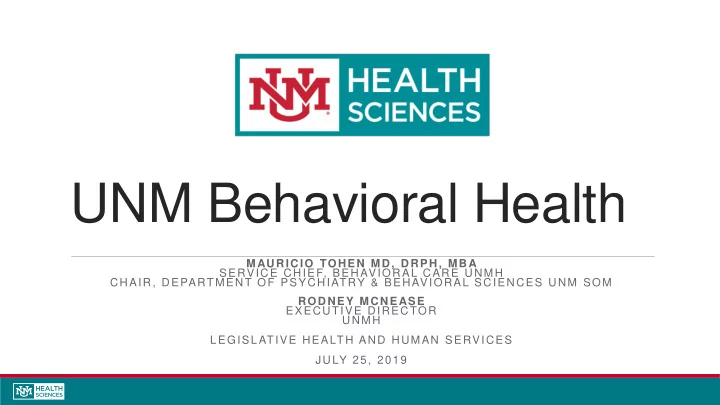

UNM Behavioral Health MAURICIO TOHEN MD, DRPH, MBA SERVICE CHIEF, BEHAVIORAL CARE UNMH CHAIR, DEPARTMENT OF PSYCHIATRY & BEHAVIORAL SCIENCES UNM SOM RODNEY MCNEASE EXECUTIVE DIRECTOR UNMH LEGISLATIVE HEALTH AND HUMAN SERVICES JULY 25, 2019
Addressing Behavioral Health/Substance Use Disorder Central to meeting our Vision and Mission
UNMHSC Strategic Focus Areas Behavioral Child Well-Being Health/Substance Use Disorder Workforce Healthy Aging Development
Current Issues and Deficits Higher rates of mental health illness and addictions than national Large deficit in meeting social service needs of behavioral health patients Chronic behavioral health provider shortage Lack of access at all levels of behavioral healthcare – especially pronounced with child services Fragmented care coordination for high needs patients System instability with high degree of administrative complexity
New Mexico Mental Health Patients New Mexico US Median 83.2% 71.0% % adults who meet SMI Criteria 72.1% 68.0% % Children who meet SED Criteria Percent of adults with co-occurring 27.0% 21.0% substance abuse Percentage of children with a 6.0% 3.0% substance abuse diagnosis 304,110 adults require mental health services 209,787 children require mental health services 44% of adults, 37% of children (12-17) with a mental illness received treatment (2010 to 2014)
UNMH Behavioral Health Operation Volume 2020 2017 2018 2019 Budget Days for all 23,301 23,809 23,680 23,934 Behavioral Operations Visits for all Behavioral 140,676 155,136 162,537 170,616 Operations Total Psychiatric 8,832 9,714 7,478 8,078 Emergency Volume Projected Projected (Calendar Year)
PES Volume Patients Seen - Includes Minors Minors ONLY Minors 2015 2016 2017 2018 2019 Pt Seen 2014 2015 2016 2017 2018 2019 Jan 51 66 72 78 119 Jan 534 524 474 538 633 777 123 Feb 45 67 97 138 Feb 487 465 447 514 625 695 70 Mar 77 91 93 127 Mar 487 540 468 611 685 723 Apr 45 65 102 110 118 740 Apr 534 492 510 656 May 54 60 80 88 113 537 May 454 542 638 669 Jun 25 46 39 83 85 Jun 447 485 496 600 719 Jul 495 487 533 636 712 Jul 34 40 51 63 545 Aug 532 526 655 671 Aug 38 50 74 81 Sep 510 501 533 646 701 Sep 49 74 95 96 579 696 Oct 487 475 685 Oct 63 77 109 116 Nov 429 470 514 662 589 111 Nov 67 67 95 Dec 462 451 517 626 641 81 Dec 51 78 104 Yearly Yearly 5871 6068 6030 7478 8070 592 770 999 1130 total Totals
UNMH Collaborations with Bernalillo County MDC BH Discharge Planning Resource Reentry Center for MDC released Inmates Pathways program expansion Care Coordination Services for patients in supportive housing Clinical Services development at MATS
UNMHSC Service Development Expanded capacity for Psychiatric Emergency Services Expanded child and adolescent services with a statewide coordinated approach Expanded statewide telehealth services Clinic at Health Sciences Center Rio Rancho Medical home for high needs adult and youth Expanded peer services – Living Room Model
Gaps Community-Based Services Statewide in rural, frontier and tribal communities Prevention Services Intensive Outpatient Treatment Partial Hospitalization Assessment BH Patients in rural EDs (telehealth) Peer Support Services Limited access to Crisis Services Provider Availability at all levels
System Impacts Public Safety Concerns Increase in Jail Population with Mental Illness Increased Utilization in Psychiatric Emergency Services and Emergency Departments Increased lengths of stay in higher levels of care – lack of other community based services Workforce availability and financial sustainability
UNM Workforce Development Nationally recognized adult Psychiatry – Addictions & Rural Fellowships in Child, Addictions, Geriatrics, Consultation Additional Addictions Fellowship Reproductive Psychiatry Fellowship Psychology Internship Program Postdoctoral Psychology Programs Partnership with College of Nursing – PNPs Physician Assistant Residency in Psychiatry Developing Forensic Psychiatry Fellowship Opening UNM HS Rio Rancho BH Clinic – Diverse training
Opportunities Work collaboratively with HSD, CYFD and DOH – Community Intensive Outpatient, Partial Hospitalization, and other intermediate levels of care Community BH providers, school-based health centers and FQHCs – systems of care in local communities with technical support from UNM Address Social Determinants of Health Expand Trauma Informed Care Collaboration – communities prevention and education High end specialty care for high needs patients
Questions?
Recommend
More recommend